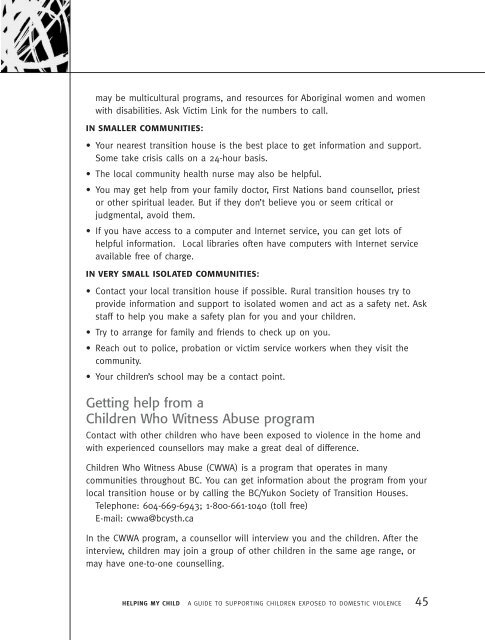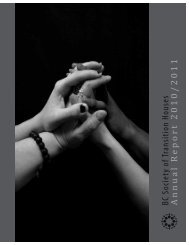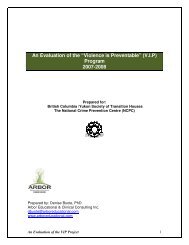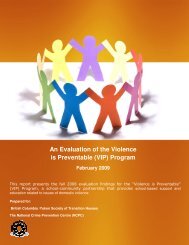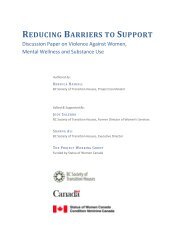a guide to supporting children exposed to domestic violence
a guide to supporting children exposed to domestic violence
a guide to supporting children exposed to domestic violence
Create successful ePaper yourself
Turn your PDF publications into a flip-book with our unique Google optimized e-Paper software.
may be multicultural programs, and resources for Aboriginal women and women<br />
with disabilities. Ask Victim Link for the numbers <strong>to</strong> call.<br />
IN SMALLER COMMUNITIES:<br />
• Your nearest transition house is the best place <strong>to</strong> get information and support.<br />
Some take crisis calls on a 24-hour basis.<br />
• The local community health nurse may also be helpful.<br />
• You may get help from your family doc<strong>to</strong>r, First Nations band counsellor, priest<br />
or other spiritual leader. But if they don’t believe you or seem critical or<br />
judgmental, avoid them.<br />
• If you have access <strong>to</strong> a computer and Internet service, you can get lots of<br />
helpful information. Local libraries often have computers with Internet service<br />
available free of charge.<br />
IN VERY SMALL ISOLATED COMMUNITIES:<br />
• Contact your local transition house if possible. Rural transition houses try <strong>to</strong><br />
provide information and support <strong>to</strong> isolated women and act as a safety net. Ask<br />
staff <strong>to</strong> help you make a safety plan for you and your <strong>children</strong>.<br />
• Try <strong>to</strong> arrange for family and friends <strong>to</strong> check up on you.<br />
• Reach out <strong>to</strong> police, probation or victim service workers when they visit the<br />
community.<br />
• Your <strong>children</strong>’s school may be a contact point.<br />
Getting help from a<br />
Children Who Witness Abuse program<br />
Contact with other <strong>children</strong> who have been <strong>exposed</strong> <strong>to</strong> <strong>violence</strong> in the home and<br />
with experienced counsellors may make a great deal of difference.<br />
Children Who Witness Abuse (CWWA) is a program that operates in many<br />
communities throughout BC. You can get information about the program from your<br />
local transition house or by calling the BC/Yukon Society of Transition Houses.<br />
Telephone: 604-669-6943; 1-800-661-1040 (<strong>to</strong>ll free)<br />
E-mail: cwwa@bcysth.ca<br />
In the CWWA program, a counsellor will interview you and the <strong>children</strong>. After the<br />
interview, <strong>children</strong> may join a group of other <strong>children</strong> in the same age range, or<br />
may have one-<strong>to</strong>-one counselling.<br />
HELPING MY CHILD A GUIDE TO SUPPORTING CHILDREN EXPOSED TO DOMESTIC VIOLENCE 45


